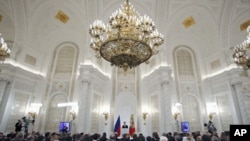The collapse of the Soviet Union 20 years ago changed the world’s geopolitical balance.
When the Soviet Union fell, it ended the tenure of a superpower with the resources of more than a dozen countries. The fall left its largest component, Russia, unable to wield anything like the global clout that the Soviet Union had for decades.
Russia expert James Nixey of London’s Chatham House research center said Russians are still struggling to come to terms with that.
Empire lost
“Those days are over, and Russia needs to reconcile itself to the fact it is no longer an empire. The empire is gone. And its ‘sphere of influence’ is an anachronism to which nobody else subscribes,” said Nixey.
Former U.S. Ambassador to Russia Thomas Pickering said after 1991 the world developed somewhat along the lines Russia expected, and the United States did not want.
“The Russians early on talked about multipolarity. Multipolarity became a dirty word in the United States - we didn’t like it. But in the end Russia and China and India, to its own extent, Europe and Japan, are all major players on the world scene - Brazil perhaps, that we’ll have to look at and work with, and we need to find new ways to deal with,” said Pickering.
Russia continues to try to assert itself in international affairs.
And it recently joined the World Trade Organization, a move Russian delegate Anatoly Chubais said is the first step toward a more prominent international role.
“After almost a hundred years of the very complicated Russian history, after the Bolshevik Revolution, after the Democratic Revolution in 1991, Russia is coming back to the civilized world," said Chubais.
Playing a positive part
A more constructive role likely would be welcomed by the West, which has worked with Russia on a few issues, including North Korea.
“Normally, Russia is a spoiler in international relations. It wants a global role. It wants to sit astride the world stage and act as it used to be able to do. And it can still do that to a certain extent. But for the most part, it acts as a spoiler or a counterweight to the West, at best,” said Nixey.
The world has changed a lot since the fall of the Soviet Union. China has become a major world power. The European Union has expanded into the old Soviet sphere of influence, and may go farther into the former Soviet Union itself. Militant groups have sought new benefactors.
Experts say 20 years later Russia’s leaders are facing a choice - try to regain the past glory of the Soviet Union, which could be irrevocably lost, or become constructive partners in the multipolar world the country’s former leaders once envisioned.














